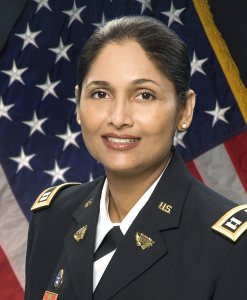
Dharm is Georgetown’s first Hindu Chaplain.
Pratima Dharm, former army captain and chaplain, recently began her work as Georgetown’s first Hindu chaplain. She joins the existing Campus Ministry staff of Catholic, Jewish, Muslim, Orthodox and Protestant chaplains. This interview has been edited and condensed for clarity.
How do you think your experience in the military will affect how you approach your new position at Georgetown?
There are a lot of parallels, but at the same time there are many new things that are unique to the campus ministry. The parallel of the age category, from 17 to about 28 or 30, is what we primarily focus on. I have been the lead chaplain for suicide prevention for years in the military. That is one of the things that we have to deal with a lot in the military with the young soldiers. Those are parallels that I find perhaps, even on a campus ministry, if they’re not apparent right now, would come forward in the future. It’s a good preparation point to start from. Also some of the main issues of identity, issues of stress related with studies and education, we see the parallels that are found in the military as well with the young soldiers.
What function do you think spirituality serves on a college campus?
I think it’s a huge part in shaping the person, the individual that comes to be a part of the Georgetown family and culture. I would use the word, “spiritual formation.” It is very relevant to the point of their lives they are in at this time, where they are not fully formed. I’m not saying that as we grow up we are fully formed, but in terms of certain choices, for young persons, especially in the age category you find predominantly at Georgetown, I find that they still have a lot of questions about identity. They have a lot of questions about the choices they are making, about career choices, about the fields to study and things of that nature, even in terms of the relationships they have as they transition from home to college. Things of that nature are very important and relevant when you bring the faith piece in. I see a powerful connection between faith, spirituality and the formation of the whole person, not just to be focused on choosing a career path, but who they become ultimately. I think spirituality and religion plays a big, huge part in that.
What have been the most rewarding aspects of your time here already?
The most rewarding aspects have been the students. Oh my goodness, they are absolutely amazing. What is really amazing to me is how much that they have carried forth from their home culture to here, and the need they have to practice their religion, their faith and their spiritual practices within their university. That amazes me. They are so young, yet it is so important to them to practice their faith. Now, that is amazing to me. And they have so many questions, that I am most of the time able to answer. That to me is amazing that I am older now and I have something to offer to them. That I am in a place that I can offer something to these kids who are so eager to learn and to know more about their faith.
How are you looking to add to Campus Ministry, and the overall Georgetown community, moving forward?
It really stems from the fact that there has never been a Hindu chaplain at Georgetown. These Hindu students have been very good about organizing themselves and getting things done that way, but I am really taking my time to hear them and to listen to them and to know what the needs are. The future plans that I am actually right now just shaping and forming is based off of what I hear from them and their needs. The need is to have a strong mentor and a person they can go to in terms of counseling. Also, it is about creating those safe places for them, because this is a little new.
At the same time, there is a need to have a chaplain and creating those spaces where their learning is facilitated, while at the same time, they also get a break from learning itself. It’s developing achieving programs that aid their learning, but at the same time, give them a respite as well. They have so much coming at them that I’m amazed at their courseload and the events they’re expected to commit to and the life that they live. I’m in that boat right now to hear them and do what I do based off of what I hear from them to really create those safer spaces of balance, where they are really able to be themselves and hopefully have opportunities for spiritual formation, within the various diverse religious opportunities you have at Georgetown. It is a Jesuit institution and a great institution, but it is also very open to learning from different faith groups as well. The intentionality behind all programs would be to make sure that Hindu students avail themselves to be participating in other faith group activities to enhance their own understanding of their own faith. I am a big proponent for people having the opportunity to experience other cultures and other belief systems that may even challenge their own beliefs. I like to use the word balance. Balance is the word, and the freedom to choose.














